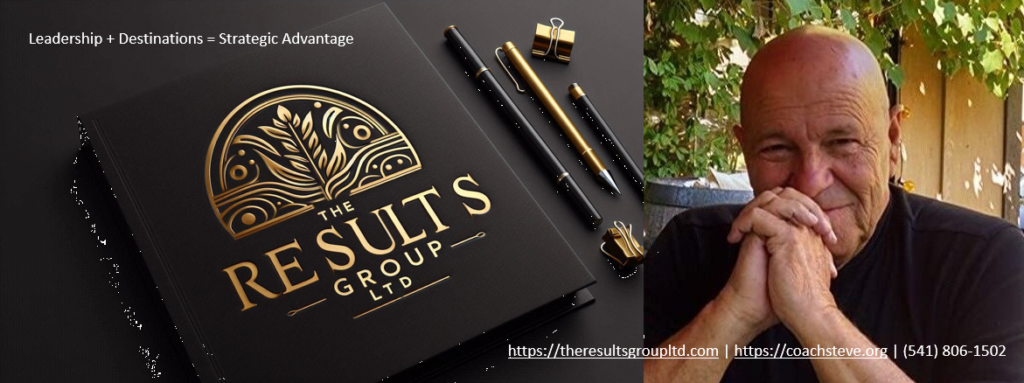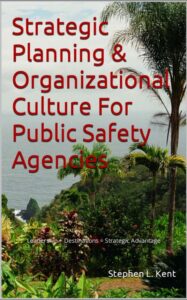
As I have noted in various articles I have written, on social media sites, and in my book, Strategic Planning & Organizational Culture for Public Safety Agencies: Too many things in America don’t get done because too many people who should know better are either lazy, unimaginative, fearful or selfish … or some combination of those four choices.
I have learned poor choices – based upon flawed beliefs about ourselves, others, and the World – are obstacles to becoming an effective adult.
I have also noted that too many of us don’t make positive, effective changes in our lives because quite often we are in love with the diseases that are killing our futures.
Some are in love with being lazy. Some are in love with being unimaginative. A lot of people are in love with being fearful. And some are in love with being selfish. I am a living testament to the fact that some are in love with all four.
I wasted many years making poor choices and then being disappointed or even shocked at poor – often embarrassingly negative – consequences of my own creation. My faulty logic created ample opportunities for self-pity parties – which fed my emotional entrenchment and more fearful, selfish choices. I, and all my futures that might have been, traveled in circles year after year.
As the renowned architect, Louis Henry Sullivan noted, “Form ever follows function.” It took a very long time but I finally determined that life is about choosing positive, effective consequences then adjusting personal choices accordingly. Your future and my future is shaped by the decisions we make now. Choose wisely.
Do bad consequences happen to good people? Of course, they do. Sometimes it is as unfortunate as being in the wrong place at the wrong time. Yet, even then, my prudent friends do not walk the unlighted alleyways in their communities at two in the morning. They’re not fearful but mindful of not putting themselves in probable harm’s way.
When things go wrong – that is, negative consequences, I have learned to spend less time second-guessing the apparent consequences. What I want to learn is, what underlying belief about themselves or others supported the driving choice? Was there a policy did that person think they were following? What expectations from their family or supervisor or significant other did they think they were using as a template for their choices?”
And so, on to the original four obstacles:
- Lazy – I have learned that a lazy body is often the physical manifestation of a lazy mind … a mind that does not challenge itself … a complacent, uninspired mind. Lazy minds drive lazy bodies. The comfort of being fed information or seeking vicarious stimulation by sitting in front of a television is, in my opinion, a near pandemic in today’s society. I have learned that too many lazy minds would rather be passively fed information in convenient unit doses rather than taking initiative to a holistic view of learning. For example, I have learned that too many people simply choose not to read.1 I was amused when I recently offered a free copy of one of the books I’ve written2 to a group of people struggling with organizational issues only to be told by each of them, “No, thanks … I don’t really read …”
- Unimaginative – I have learned that, in their own way, everyone is an artist; a writer, a composer; an architect; an actor; a sculptor; a teacher. Yet, throughout life, many of us have been told our drawings were not good enough, our photos were not good enough, our syntax sucked; we did not understand punctuation; our ideas wouldn’t “fly,” our dreams were not “realistic” or were “pie in the sky.” Hmm … according to whose standards? So-called, “standards” that seem to govern creativity are invariably arbitrary and tend to minimize thought-risk to the observer. Through faulty logic too many of us are taught to see obstacles where there are no obstacles; limits where there are no limits; boundaries where there are no boundaries except those set by others (who may well be lazy, unimaginative, fearful or selfish …) If your drawing looks like a flower to you, then it’s a flower; don’t let anyone tell you otherwise. If you sing your aria in the shower or on the street corner it’s your aria; be your own audience. Write because you want to write – whether or not anyone ever reads it. The faulty belief that we are not qualified to be artists is a self-fulfilling prophecy. If we don’t ask our souls to imagine – to be heard – our souls cannot say, “Yes.”
- Fearful – as I note in the header of this blog: “I wonder what I could have achieved in my life had I not been so afraid …” I can count on one hand the number of years in my life that I haven’t been afraid of, well, something … “What if they don’t like me?” “What if I don’t know the answer?” “What if …? “ “What if …?” I have learned to ask myself, what am I trying to heal from? The learned fears of my caregivers? New fears I have invented for myself? For too many years I consciously or unconsciously sought situations that reinforced my fears because motivating myself by my fears was what I knew how to do best.
- Selfish – Do you know the worst kind of family member or acquaintance or co-worker or supervisor to have or to be? Someone with high ego needs and low self-esteem. Such folks cannot stand to see others succeed and will often go out of their way to undermine the credibility, skills, or intentions of others. I have learned that selfishness is a form of self-protection based upon, yes, being fearful. I am not a particularly religious guy so what I’m about to write is not so much about religion as it is about mathematics: I believe that in a godless society, all we’re left with is ‘me-me-me’. Humans need meaning – something larger than themselves. Such meaning may come from church or commitment to family or adherence to values – but without them, you will see an entitlement mentality, withdrawal from social situations … and be solely motivated by ‘me-me-me …’
Where’s The Fix? What do I do to overcome the disease?
- Fix: Lazy: It doesn’t happen often, but, sometimes I simply feel the unchallenged comfort of being lazy. In those situations, I force myself to get up and get going regardless of how I feel. At my age bones and muscles don’t always want to respond as quickly as when I was young and morning seems to come ten minutes after I fall asleep. Get up. Move around. We don’t have to run marathons but, being dormant is just lazy and unhealthy. Today’s choices create tomorrow’s consequences. It all depends upon what we want those consequences to be, right? We’ll have enough time to rest later … in The Long Dirt Nap.
- Fix Unimaginative: Read, listen, learn, write! Pick up a pen and doodle. You needn’t create something that looks “real” for goodness sake! Create for the sake of creation. Create to please yourself. In the end that is all that matters. Don’t feel obligated to copy others. Imagination is your soul seeking to be heard; listen to it.
- Fix Fearful: We often inherit the fears of our original caregivers. I know I did. I lived out those deep-seated fears long after the original carriers had become functioning adults and moved on to other things. I also know that – early in life – I was that fearful caregiver who unwittingly passed along my fears to my children. I have learned that phobias tend to be transmissible disorders … fear of heights … fear of spiders … fear of change … fear of confrontation … fear of abandonment … fear of rejection … fear of failure … fear of success … fear of leaving toxic relationships. I have learned that risk is an inherent part of life. I have learned there is a difference between being prudent and having my future stalled by fear. I have learned that failing – like giving up – is an event rather than a self-defining lifestyle. I have learned that I won’t die if I speak up for my beliefs and values. I have learned that I won’t die if I sever toxic relationships. I have learned to replace fear with confidence in myself and in others.
- Fix Selfish: I have learned there is a difference between being “selfless” and being “selfish.” Selflessness – protecting the rights, lives, safety, health, and reputations of others – is a requirement for those who seek to live in a peaceful society. “Selfish” is demanding what we want when we want it even when it means that others are disadvantaged or even harmed. There’s always something larger than ourselves. Go out. It’s out there. Find it. I have learned that we are each important, but we are not indispensable. Do something for another person or group of people. Lift people up and, in doing so, lift yourself, your family and your community. Selfish doesn’t make a difference in the world; only selflessness does so. “Too often we underestimate the power of a touch, a smile, a kind word, a listening ear, an honest compliment, or the smallest act of caring, all of which have the potential to turn a life around.” (Leo Buscaglia)3
Ultimately, how do we deal with Lazy? Unimaginative? Fearful? Selfish?
It’s easy.
Adult like you mean it. – s
Do you or someone you know need help with leadership coaching, organizational development, team building, strategic planning, communication, or creating a personal vision?
It’s what I do.
Visit the homepage, The Results Group, Ltd. to review course outlines and register for Leadership Training academies.
Visit “Mind Your 4 Peas” for Personal Life Coaching sessions.
And, I am always an email ([email protected]) away.
You can always contact me to schedule a tailored experience for you and your team!
1 “How many books did you read in 2023? Are you in the top 1 percent?” Washington Post, Andrew Van Dam, January 5, 2024
2 Click the link to purchase books I’ve written: Covered With Montana; Strategic Planning And Organizational Culture For Public Safety Agencies, Amazon





Please comment with your real name using good manners.